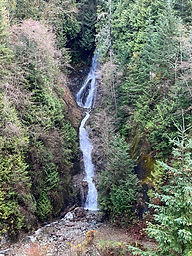Reefs and Rockfish Await Revitalization
- kc dyer

- Nov 17, 2025
- 3 min read
Increased protections help ensure the health of the Sound

Council is poised to finalize a response to Fisheries and Oceans Canada (DFO) this week on a new initiative designed to increase protection for endangered species within Átl’ka7tsem / Howe Sound.
The Marine Conservations Target Initiatives Update (MCTIU), was developed and released this fall by DFO in order to receive First Nations and other stakeholder input on the Glass Sponge Reef-Rockfish Conservation Area (GSR-RCA) project.
The glass sponges in particular form part of a remarkable Lions Bay ecological success story.
In 1984, Lions Bay resident Glen Dennison, an avid diver, was researching a book on the subject when he made a startling discovery. In the depths of Howe Sound, the southernmost fjord on the west coast of British Columbia, Dennison discovered a number of glass sponge reefs, long thought to be extinct.
Radiocarbon dating suggests that the glass sponge reefs in Queen Charlotte Sound started forming as long as 9,000 years ago. But the Sound, with its high levels of pollution from resource-extraction industries, was thought to be a dead zone for these fragile creatures.
In the years since his discovery, Dennison has worked for the protection of these glass sponge reefs, as well as the rockfish that thrive within these waters.
In 2015 DFO put the first protections in place, which were further reinforced in 2019. By 2022, thirteen refuges for glass sponge reefs were established in Átl'ḵa7tsem /Howe Sound and the Salish Sea. The Marine Life Sanctuaries Society (MLSS), for which Dennison acts as advisor, is a group of citizen scientists who work to protect the marine ecosystems in the area.
GSRs play a critical role in marine ecosystems. According to the DFO, these reefs provide habitat, refuge, and nursery areas for over 120 aquatic species, including rockfish, sea stars, crabs, and spot prawns.
Lions Bay resident and Climate Action Committee member John Robb echoes the importance of this ecosystem. "Glass sponges are globally unique, but vital components of Howe Sounds ecosystem," Robb said in his presentation to Lions Bay Council last week. "The reefs serve as habitat, nursery, refuge, and feeding grounds for a remarkable variety of marine life, including rockfish, prawns, crabs, sea stars, shrimp, and many other invertebrates and fish."
Robb notes that biodiversity within the glass sponge reefs is considerably higher than in surrounding areas—up to three times more species have been recorded among the reefs. They contribute to ocean health by filtering vast quantities of water, he says, "with reefs capable of filtering billions of litres of water each day, removing bacteria and excess organic matter, and contributing to improved water quality. The filtration process also cycles nutrients such as nitrogen and carbon, supporting the productivity of the broader ecosystem."
He adds that the complex reef structures help stabilize the marine ecosystem by linking seafloor and pelagic open water environments, and supporting food webs, thereby enhancing the entire region's resilience to environmental change.
As a species, however, glass sponges are very sensitive, with exoskeletons make of fragile silica. They are incredibly long-lived, but also grow very slowly at a rate of only one to two centimetres per year. This makes these reefs highly vulnerable to any bottom-contacting activities, including fishery.
Since 2014, DFO has implemented conservation measures aimed at protecting the structural integrity and ecological function of GSRs, in hope of ensuring their continued role in supporting biodiversity and maintaining healthy marine ecosystems and fisheries.
As for the rockfish, Robb says they serve as both predators and prey in the marine environment, and the presence of strong rockfish populations contributes to the overall stability and productivity of marine communities. He says that healthy, protected rockfish populations facilitate the replenishment of fish stocks in surrounding areas, increasing abundance and productivity even in unprotected regions, benefitting both the ecosystem and sustainable fisheries.
Robb calls rockfish an "indicator species", which means that looking after them confers protection to the diverse marine habitats in which they live, and their health is used to gauge the effectiveness of marine conservation efforts.
The MCTIU report closes with an invitation to direct feedback to the Marine Conservation - Fisheries Management team via email:
Council has said they will draft and send a letter of response to DFO before the November 21 deadline.
Have thoughts to share about the health of the Sound? Leave your comments below, or email us at editor@lionsbaywatershed.ca
Like what you're reading? For as little as $5/month, you can support local independent journalism by subscribing to The Watershed HERE.








Great work, John!